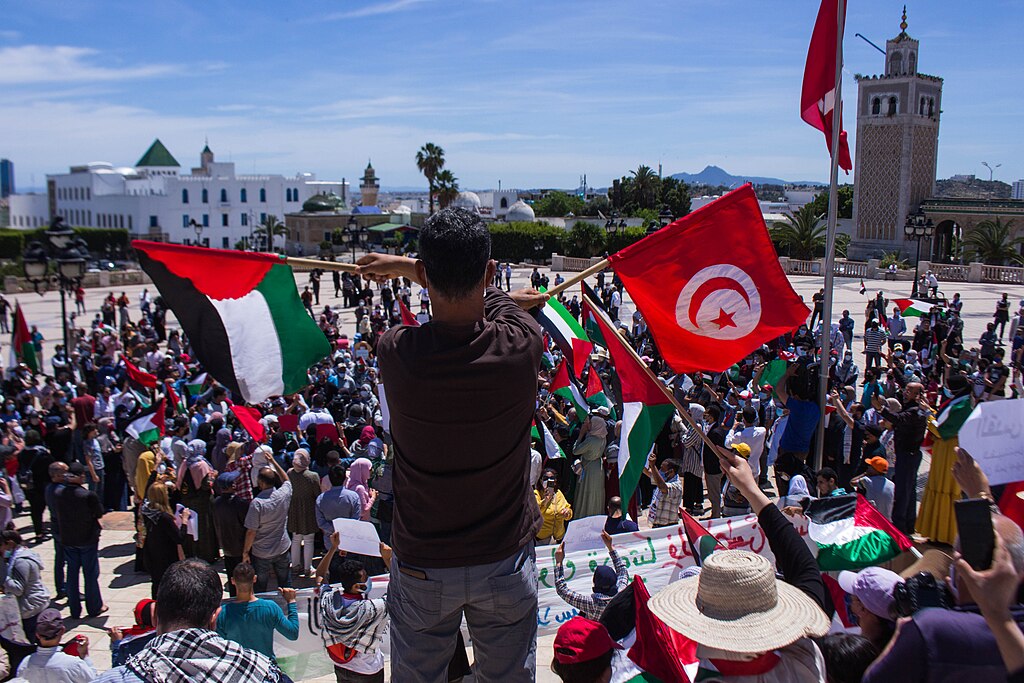There are moments when history shifts radically, not with the sound of cannons, but with the strength and courage of convictions.
While the Israeli army blocked access to Gaza for the sailboat Madleen, belonging to the "Freedom Flotilla" coalition, a large land convoy (Al-Soumoud Convoy) departed from the Maghreb with the objective, also, of "breaking the blockade" imposed on Gaza by the Israeli state.Gathering dozens of coaches and hundreds of vehicles, this convoy now comprises over 7,000 people who are meeting in Cairo this Thursday, June 12, before continuing their journey together towards Rafah, where they plan to arrive on June 15. The march, initiated by an international citizens' collective, brings together participants from 52 countries around the world.
These thousands of women and men are sending a strong message: facing the impotence of the powers, the paralysis of international institutions, and the cowardice of leaders, the peoples of the world can still take their destiny back into their own hands.
By travelling these roads, they are breaking the silences and recalling a truth that many wish to suppress: the Palestinian people are not alone. They are telling the world that what is happening there, in Palestine, concerns all of us here, and that it is everyone's duty to break the isolation of oppressed peoples.
More broadly, it’s no coincidence that the peoples of the Arab world are at the forefront of this mobilisation. It is these peoples who, over the past two decades, have embodied the most powerful revolutionary moments of our era. From Tunis to Cairo, from Sanaa to Damascus, from Algiers to Beirut, the "Arab Springs" marked world history.
These peoples know what it means to resist authoritarian and brutal regimes. This mobilisation is the natural extension of the political consciences forged during the revolts of the Arab world. It demonstrates that a people who have risen for their own dignity are capable of rising for that of others.
Thus, beyond national borders, spontaneous solidarities often unite Arab peoples who share a history, a language, and common struggles.On the other side of the barricade, the Arab ruling classes, whether military, monarchical, or religious, tend to form a homogeneous bloc, united by common economic, security, and diplomatic interests with the rest of the world's bourgeoisies.
This tacit alliance between the world's dominant classes reinforces their capacity to repress popular movements, often in the name of national stability, as the Egyptian government is attempting to do, also recalling the consequences of the Arab Spring on its territory.
It is for this reason that this international initiative is facing a wall of repression ordered by Israel and enforced by Egypt.Indeed, through its Minister of Defence, Israel publicly demanded that Egypt block this march, even going so far as to label the demonstrators as "jihadists." Since then, the Egyptian authorities have multiplied their intimidations: arbitrary arrests, expulsions, police raids on hotels of foreign delegations, detentions without cause.
These events recall a simple truth: when states betray the principles of justice and freedom, it is the peoples who rise up to uphold them. And when they rise up, the violence of the established order systematically confronts them.
From the sailboat Madleen to the Al-Soumoud Convey, we will remember that History always belongs to those who have the courage to make it shift.
To support the courageous participants of the Caravan, as well as the members of the Madleen crew still imprisoned in Israel, join the demonstrations across France this Saturday!
Illustration image: "Demonstration for standing with Palestine in Tunisia Tunis Kassba square", photograph from May 15, 2021, by Brahim Guedich (CC BY-SA 4.0)
